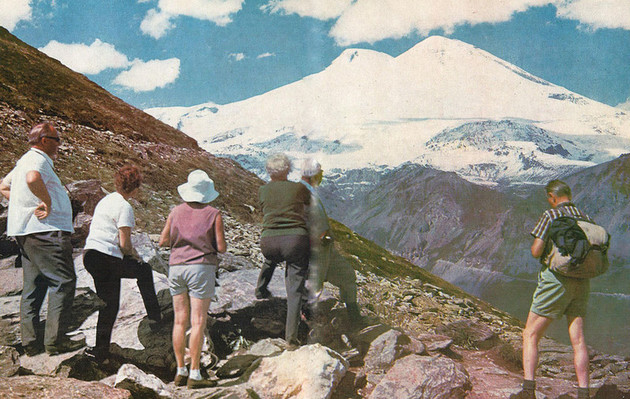By Anatoly Ageyev, exclusively for Vestnik Kavkaza
Pyatigorsk held a council on the development of the Kislovodsk treatment park on May 19, attended by Russian Plenipotentiary Presidential Envoy to the NCFD Sergey Melikov and Russian Minister for the North Caucasus Lev Kuznetsov. According to the Russian president's orders of April 20, 2015, the Russian government and the administration of Stavropol Territory are to present proposals on complex development of Kislovodsk by September 1 and take a complex of measures for preservation and development of the park by October 1.
The sources of financing are the biggest concern. Besides the orders of April, the executives are to consider imposing a resort fee. Why is the topic being raised again and again and is the fee as dreadful as they say it is?
The USSR did have such a fee as a state well-aware of its workers' health. The fees were spent on maintaining treatment centers and recreation zones. But the fee was unrelated to taxes: organizations and enterprises offering tours to their employees were simply allocating money from the salary fund or from trade union funds to sanatorium and resort organizations.
Clearly, the Soviet times have long been gone. Neither employers nor trade unions usually pay for their employees' vacations. Moreover, they are reluctant to sponsor resorts. Maintaining treatment centers and showplaces, including the Kislovodsk Park, without financing is almost impossible.
It is noteworthy that the most die-hard adherents of the resort fee are the heads of regions and cities who want to keep and develop recreational platforms.
Andrey Murga, deputy head of government of Stavropol Territory, advocates the fee: 'If tourists see a clean city, tidy parks, garbage disposed on time, they will understand where the money goes.'
Let's calculate the impact of the resort fee on the budget of tourists. Say, a fee of 3% of the tour's value is imposed on a mother who visits Kislovodsk for two weeks to have her child treated.
Regarding elite sanatoriums, such as Solnechny, half a month at the resort will cost 120,000 rubles. The resort fee would amount to about 3,500. Everything here is clear: those who can afford 120,000 rubles can easily spend 3,500. Cheaper treatment centers will cost 40,00-42,000 rubles for two weeks. A comfortable mini hotel or a guest house will cost about the same. The resort fee in that case would be below 1,200 rubles. Let's be honest, the figure debated is just not worth the disputes.
If the USSR experience is unconvincing, check out the European practice. The resort fee in one form or another exists in many countries. For example, Germany imposed a so-called citytax a few years ago, which totals about 5% of the price of a tourist bed. On average, the daily fee totals around 2.3 euros. Prestigious hotels, such as Bad Kissingen or Baden-Baden, may cost up to 3,500 euros per adult.
Resorts of the North and the Baltic Seas have a one-time resort tax of 20 euros, which both foreign and local tourists pay. The same fees can be seen in Bulgaria, France and Croatia, the value depends on the hotel category.
In general, a citytax is quite traditional for all tourism cities in Europe. Its value depends on the appetite of local municipalities and hotel categories: the highest is in 5-star hotels, the lowest is in camps. Paris has the lowest fees, only 0.2 euros for camping and 1.5 euros for an elite hotel. The fees in Rome are rather sensitive for tourists (3-7 euros). The highest fees are in Brussels (2.15-8.75 euros). A tourist tax of 6 Swiss francs is complemented by a transport fee of 1.5 francs and an accommodation fee of 1 franc. Amsterdam, Berlin, Budapest, Vienna and other cities have a citytax calculated according to the cost of a night's stay in a hotel (an average of 3-6% added to the cost of a hotel room).
Some countries have a concealed fee. India, for instance, requires foreign tourists to pay up to 500 rupees, 30-50 times more than a local would. The funds are spent on the upkeep of territories. Abkhazia and Belarus collect 30 rubles a day and 1-3% of a tour's value respectively. Ukraine used to collect about 5 hryvnias a day.
There is a group of skeptics worried about the management of the resort fee, they claim bureaucracy will need to be paid about as much as the fee itself. There are two options for monetizing the fee: Asian and European. In Southeast Asia, a tourist pays the fee to a hotelier. In European countries, tour operators add the fee to the tour cost and allocate it to the region (although the aforementioned citytax is usually paid to a hotel). Both cases have flaws, but the systems are quite effective, as seen in the quality of services and the excellent condition of resorts.
The disputes around the resort fee will certainly go on. But the fact is that Russian resorts need support. A resort fee could help: according to expert evaluations, Kislovodsk could spend an additional 200-500 million rubles annually to maintain its park. This means healthy trees and bushes, maximum treatment effect, cleanliness and safe tourism. The fee is more of a moral annoyance than a material one. But is there an alternative? The question seems rhetorical.






